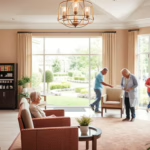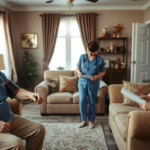Over 6 million Americans live with Alzheimer’s disease. Many more are touched by other forms of dementia. As people get older, families look for ways to care for their loved ones the best way possible.
Caring for seniors with dementia is tough. It involves managing daily tasks and meeting their emotional needs. Hudson Senior Healthcare is a trusted help for families facing these challenges. They can be reached at (469)893-0806 or online at HudsonSeniorhealthcare.com.
Key Takeaways
- Understanding Alzheimer’s and dementia is crucial for effective care.
- Creating a supportive environment can significantly improve the quality of life for seniors with dementia.
- Families can benefit from professional guidance and resources.
- Early diagnosis and intervention are key to managing the disease.
- Caregiver support is essential for the well-being of both the caregiver and the senior.
The Growing Challenge of Alzheimer’s and Dementia in America
Alzheimer’s and dementia are becoming more common in America. They pose big challenges for families and healthcare systems. As more people age, the need for understanding and support grows.
Current Statistics and Trends in 2023
Recent numbers show a big increase in Alzheimer’s and dementia cases in the U.S. In 2023, over 6 million Americans have Alzheimer’s. Many more have other types of dementia. The trend is clear: these conditions are becoming more common.
Impact on Families and Healthcare Systems
Alzheimer’s and dementia affect families in many ways. They impact not just the patients but also their caregivers and loved ones. Families face emotional, physical, and financial challenges in caring for their relatives.
Healthcare systems are also feeling the strain. They need more specialized care and support services.
- Emotional strain on caregivers
- Financial burden of long-term care
- Increased demand for healthcare services
The Rising Prevalence in Texas Communities
Texas is also facing the growing challenge of Alzheimer’s and dementia. Communities in Texas, like Plano and Dallas, are seeing more cases. Hudson Senior Healthcare is working hard to provide support and care services across Texas.
Understanding Alzheimer’s and dementia is key for families and caregivers. By staying up-to-date with the latest trends and support options, communities can tackle these challenges better.
Understanding Alzheimer’s Disease vs. Dementia
Alzheimer’s disease is a type of dementia, but not all dementia is Alzheimer’s. This difference is key for care. Knowing the difference helps families care for their loved ones better.
Defining the Conditions: Key Differences
Alzheimer’s disease causes the brain to shrink and brain cells to die. Dementia is a decline in cognitive function, like memory loss and problem-solving. Alzheimer’s is a specific disease, while dementia has many causes.
Common Symptoms and Disease Progression
Alzheimer’s symptoms include memory loss and trouble with communication. Dementia symptoms vary but often include memory loss and cognitive decline. Knowing these symptoms helps in managing symptoms of alzheimer’s in seniors well.
Breakthrough Research and Treatment Developments
New research is improving our understanding of Alzheimer’s and dementia. Studies aim to find new treatments. Caregivers can find resources for alzheimer’s caregivers through organizations focused on Alzheimer’s research and support.
| Condition | Primary Characteristics |
|---|---|
| Alzheimer’s Disease | Progressive neurological disorder, memory loss, cognitive decline |
| Dementia | Broad term for cognitive decline, various underlying causes |
Early Signs and Diagnosis: What Families Should Watch For
The journey to diagnosis starts with noticing small changes in behavior and thinking. It can be hard for families to tell if these changes are just part of aging or if they are signs of Alzheimer’s or dementia.
Warning Signs That Shouldn’t Be Ignored
Spotting the disease early is crucial for effective management. Some early signs include:
- Memory loss that disrupts daily life
- Challenges in planning or solving problems
- Confusion with time or place
- Difficulty with words in speaking or writing
Table: Common Early Signs of Alzheimer’s and Dementia
| Symptom | Description |
|---|---|
| Memory Loss | Forgetting recently learned information or important dates |
| Communication | Struggling to find the right words or following conversations |
| Mood Changes | Becoming easily agitated, anxious, or depressed |
The Modern Diagnostic Process
Diagnosing Alzheimer’s and dementia involves a detailed assessment. This includes looking at medical history, physical exams, lab tests, and cognitive tests. Dr. Maria Carrillo, Chief Science Officer at the Alzheimer’s Association, says, “Early diagnosis leads to earlier treatment, which greatly improves life quality for those with Alzheimer’s and their caregivers.”
“Early diagnosis is crucial for managing Alzheimer’s effectively and improving the quality of life for those affected.”
Approaching Difficult Conversations with Loved Ones
Talking about cognitive decline with family members can be tough. It’s key to do so with empathy and understanding. Hudson Senior Healthcare, serving Texas, including the Dallas-Fort Worth Metroplex, stresses the need for caring support during this time.
By knowing the early signs and the diagnostic process, families can offer the right support and care for their loved ones.
Creating a Safe and Supportive Home Environment
A well-designed home can greatly improve life for those with Alzheimer’s and dementia. Families can make their homes safe and supportive by making specific changes. These changes meet the needs of their loved ones.
Essential Home Modifications for Safety
It’s important to make the home safe to prevent accidents. Some key changes include:
- Removing tripping hazards such as rugs and clutter
- Installing handrails in strategic locations
- Improving lighting throughout the home
- Securing doors and windows to prevent wandering
Establishing Consistent Routines and Familiar Surroundings
Having a daily routine and familiar surroundings can comfort those with Alzheimer’s and dementia. This can be achieved by:
- Creating a schedule for daily activities
- Placing familiar objects in visible locations
- Minimizing changes to the home layout
Hudson Senior Healthcare stresses the need for a supportive environment. By using these strategies, families can greatly improve their loved ones’ well-being.
Innovative Technology Solutions for Monitoring and Support
Technology is crucial in supporting seniors with Alzheimer’s and dementia. Some innovative solutions include:
| Technology | Description | Benefit |
|---|---|---|
| GPS Tracking Devices | Allow for the location of individuals to be tracked | Prevents wandering and ensures safety |
| Medication Reminders | Automated reminders for medication | Ensures adherence to medication schedules |
| Home Monitoring Systems | Monitors the home environment for safety | Provides peace of mind for families |
By combining home modifications, routines, and technology, families can create a full support system for their loved ones.
Caring for Seniors with Alzheimer’s and Dementia: What Families Need to Know
Caring for loved ones with Alzheimer’s or dementia requires a detailed plan. It involves daily care, communication, and managing behavior. Families need the right strategies and knowledge to support them well.
Evidence-Based Daily Care Strategies
Using evidence-based daily care strategies can greatly improve life for seniors with Alzheimer’s and dementia. This means setting up a routine, making the home safe, and encouraging independence.
- Create a daily schedule to provide a sense of familiarity and structure.
- Modify the home environment to reduce hazards and improve safety.
- Encourage seniors to perform tasks on their own to maintain independence.
Effective Communication Techniques
Good communication is key when caring for seniors with Alzheimer’s and dementia. Using simple language, keeping eye contact, and being patient can make interactions better.
| Communication Technique | Description | Benefit |
|---|---|---|
| Simple Language | Use clear and concise language | Reduces confusion |
| Eye Contact | Maintain eye contact during interactions | Improves engagement |
| Patience | Allow seniors to process information at their own pace | Reduces frustration |
Managing Challenging Behaviors Compassionately
Managing tough behaviors in seniors with Alzheimer’s and dementia needs compassion and understanding. Finding what triggers these behaviors and using non-medical solutions can help.
By using a full care approach, families can offer top-notch support. This includes daily care strategies, communication tips, and caring for challenging behaviors. Hudson Senior Healthcare focuses on personalized care plans that meet each person’s unique needs.
The Importance of Self-Care for Family Caregivers
Family caregivers are crucial in supporting seniors with Alzheimer’s and dementia. However, they often forget to take care of themselves. Caring for a loved one is a big responsibility that can affect their health. It’s key for caregivers to focus on their own self-care to keep up their support.
Recognizing and Preventing Caregiver Burnout
Caregiver burnout is a state of exhaustion. It happens when caregivers lack support or breaks, affecting their care quality. Recognizing burnout signs, like constant tiredness, irritability, and avoiding social events, is important. To avoid burnout, caregivers should seek help, take breaks, and engage in self-care like exercise or hobbies.
Building an Effective Support Network
A strong support network is essential for caregivers. This includes family, friends, support groups, and professional help. Connecting with others who get caregiving challenges offers emotional and practical support. Caregivers should ask for help when they need it.
Respite Care Options in Texas
Respite care gives caregivers a break, allowing them to rest or handle personal tasks. In Texas, there are many respite care options, like in-home care, adult day programs, and short-term stays in memory care facilities. Hudson Senior Healthcare provides specialized respite care for seniors with Alzheimer’s and dementia, helping caregivers.
By focusing on self-care, recognizing burnout, building a support network, and using respite care, caregivers can stay well. They can also keep providing top-notch care for their loved ones.
Professional Care Options: When to Consider Additional Help
As Alzheimer’s and dementia progress, families often need to look into professional care for their loved ones. This step can be tough, but knowing about the care services helps families make good choices.
Specialized In-Home Care Services
Specialized in-home care services help seniors stay in their own homes. They offer personal care, manage medications, and provide companionship. Hudson Senior Healthcare’s specialized in-home care services support both seniors and their families. They give families a break and ensure seniors get the care they need.
Adult Day Programs and Their Benefits
Adult day programs give seniors a place to do activities, socialize, and get care. These programs are great for those with cognitive decline. They keep minds active and help seniors stay connected with others. Families feel better knowing their loved ones are safe and cared for.
Evaluating Memory Care Facilities
When looking at memory care facilities, families should check the care level, staff qualifications, and environment. Look for facilities with personalized care plans, secure areas, and activities for those with Alzheimer’s or dementia. Visiting potential facilities and asking detailed questions is key to making the right choice.
In conclusion, looking into professional care is a big step for seniors with Alzheimer’s or dementia. By understanding the care options, families can support their loved ones better and ensure they get the right care.
Hudson Senior Healthcare: Specialized Dementia Care Across Texas
For families facing Alzheimer’s and dementia, Hudson Senior Healthcare in Texas offers help. They understand the challenges of caring for seniors with these conditions. They provide support that meets each family’s unique needs.
Innovative Memory Care Approaches and Services
Hudson Senior Healthcare leads in dementia care with innovative memory care approaches. They improve the lives of seniors with:
- Personalized care plans
- Memory care programs
- Help with daily activities

Service Areas Throughout Dallas-Fort Worth Metroplex
Hudson Senior Healthcare helps families in the Dallas-Fort Worth Metroplex. They offer top-notch dementia care across Texas. Their services cover:
- Dallas
- Fort Worth
- Surrounding areas
Patient-Centered Care Philosophy and Success Stories
Hudson Senior Healthcare puts patients first with a patient-centered care philosophy. They focus on each person’s unique needs. This has led to many success stories, with families seeing big improvements in their loved ones.
“Hudson Senior Healthcare has been a blessing to our family. Their compassionate care and understanding have made a huge difference in my mother’s quality of life.” –
How to Connect with Hudson Senior Healthcare Specialists
Families wanting to learn more about Hudson Senior Healthcare can visit their website or call their office. For alzheimer’s and dementia care tips and to see how they can help your family, contact them today.
Financial and Legal Considerations for Families
Caring for a family member with Alzheimer’s or dementia comes with many financial and legal hurdles. Families must find their way through complex systems to get the help their loved ones need.
Navigating Medicare, Medicaid, and Insurance Coverage
It’s key to know the difference between Medicare and Medicaid. Medicare pays for medical bills, while Medicaid helps with long-term care for those who qualify. Families should check their insurance to see what’s covered.
Essential Legal Documents for Alzheimer’s Patients
Having the right legal papers is important to protect Alzheimer’s patients. This includes a durable power of attorney, living will, and advance directives.
Long-term Financial Planning Strategies
Planning for the future financially is crucial. It helps families cover the ongoing care their loved ones need. Talking to financial advisors can help explore options like veterans’ benefits or long-term care insurance.
| Financial Resource | Description | Benefit |
|---|---|---|
| Medicaid | Government program for low-income individuals | Covers long-term care costs |
| Veterans’ Benefits | Benefits for eligible veterans | Assistance with care costs and other expenses |
| Long-term Care Insurance | Private insurance for long-term care | Covers costs associated with long-term care |
Conclusion: Moving Forward with Compassion and Knowledge
Caring for seniors with Alzheimer’s and dementia needs a deep understanding and compassion. Families facing this challenge can find help by spotting early signs and making a safe home. They can also use professional care options.
It’s key to understand Alzheimer’s and dementia in seniors to care for them well. Keeping up with new research and care methods helps a lot. Hudson Senior Healthcare offers specialized dementia care in Texas, focusing on each person’s needs.
Families can count on Hudson Senior Healthcare for support and advice. By using both knowledge and compassion, caregivers can greatly improve seniors’ lives. This ensures they get the care and respect they deserve.




